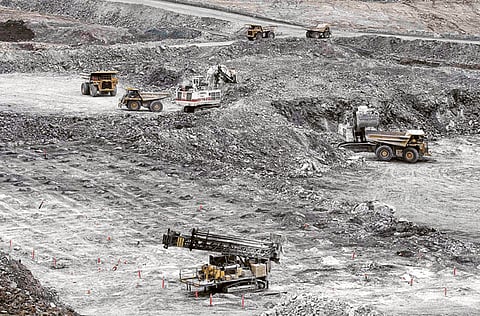Demand surge for metals could cost us the earth
For too long mining companies have used the mantra of growth and profits as an excuse for environmental destruction

London: Have you noticed that mining is increasingly getting up people's noses? Globally, more communities are fighting it. Gaggles of poor villagers are taking on well-connected, cashed-up companies representing the brutish but powerful foundation of the globalised free market system. You have to admire their style.
Take Sumba, eastern Indonesia, which is currently pocked with the telltale signs of gold exploration. Its seams, Australian Hillgrove Resources says, are rich and promising. The local people's response? Consistent riots and outrage.
As they see it, gold mining threatens their land, water, culture their very being. It usually takes about 691,000 litres of water to produce one kilogramme of glitter. In the necklace of dry eastern Indonesian islands that hang delicately above Australia, water is more precious than gold.
Australian behemoth BHP, which recently posted a A$22.5 billion (Dh87.35 billion) profit, ceded the licence after local protests showed no sign of abating. Hillgrove cannot say it wasn't warned.
On Palawan, a glistening gem of an island in the Philippines, a story all too familiar in Asia is also unfolding. A rich and powerful Forbes-listed airline magnate, Lucio Tan, in partnership with a UK mining giant Toledo Nickel, wants to mine one of Asia's last significant old growth forests (thus reducing significant carbon sequestration potential) to take advantage of record prices for the nickel needed to run hybrid cars and satisfy our addiction to gadgets.
But the tech-savvy indigenous people would rather have trees. On the Philippine island of Luzon, mining companies with names like health resorts, Oceana and Oxiana, are both facing opposition from the locals.
Increased dividends
In Australia, things are no better. A random news sample indicates that farmers, not known for their radicalism, have lately been sitting resolutely on folding chairs bearing placards against coal seam mining. Western Australian farmers were told to remove signs opposing an iron mine threatening to sap water needed for crops and livestock.
As global financial institutions seismically heave, demand for metals - gold in particular - intensifies. Shareholders might nervously read reports of protests, but their loyalty is bought by increased dividends. How can the environment win against such kitchen bribery?
The plodding Australian resources minister Martin Ferguson dismissed the opposition, asserting the people have no rights over what lies beneath, adding ominously that farmers and indigenous peoples cannot veto mining.
National interest
We are told it is in the national interest, but increasingly that is code for elite interests. After all, the test of any participatory democracy is the power of its peoples to influence their destiny. Mining companies thus far have used the mantra of growth and profits to excuse their habitat destruction.
The environment is one of the last of the global commons, and the sociocultural consequences and environmental costs of mining are increasingly unacceptable. This is especially so on small islands where water and arable land are limited.
Papua New Guinea's minister for mines Byron Chan recently announced that he was changing the law to "hand ownership from the government to land owners". Greg Anderson, of the Australian chamber of mines and petroleum, choked on his tie when asked to respond.
Obstacles and community shareholders are clearly not his thing. Sumba, where electricity is intermittent, cannot spare the 143 gigajoules of energy it takes to produce one kilogramme of gold nor do they need the greenhouse emissions or toxic additives like cyanide. Merely opening the earth delivers methane and carbon emissions.
More carbon is produced by processing, transport and manufacture. The price of gold cannot possibly make up for what the environment pays.
In a dazzling display of chutzpah, the Queensland environmental defenders' office (EDO), along with Friends of the Earth, launched a court case against Xstrata coal, opposing a 32,000 hectare claim in Western Queensland. The EDO's case cites the future climate consequences to the global environment of both the mine and the coal's future use. One is tempted to cheer.
Until now, mining has been a favoured child, not overly fettered by ethics. It's time that people's rights took precedence. Ethics and morality, seemingly redundant in an instant gratification world, may soon re-enter the dance, nudging unbridled growth off the stage.



